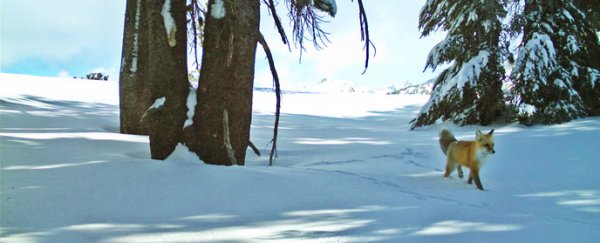For the first time in almost 100 years, a critically endangered Sierra Nevada red fox (Vulpes vulpes necator) has been spotted in California's Yosemite National Park.
Motion-sensing cameras at the north of the park captured two photographs of the animal, once in December 2014 (above) and again earlier this month, allowing researchers to identify and confirm the sighting.
It's estimated that there are only 50 of the Sierra Nevada red foxes left, although they once were common across the Sierra Nevada mountain range, as well as other ranges across California.
"We are thrilled to hear about the sighting of the Sierra Nevada red fox, one of the most rare and elusive animals in the Sierra Nevada," Don Neubacher, Yosemite National Park Superintendent, explained in a press release.
Although this is the first verified sighting of the fox, there have been rumours of the species in the area since 1977. But, as Robbie Gonzalez reports for io9, verifying those reports are incredibly difficult - which is why the new photographs are so exciting.
"Biologists at Yosemite National Park have received only ten red fox sighting reports since 1977, most of which occurred in or near Yosemite Valley… Unfortunately, sighting reports are notoriously inaccurate, and without a photograph or voucher specimen, it is impossible to confirm whether the sighting was of a red fox or some similar canid such as a grey fox or coyote," biologist John D. Perrine from the University of California, Berkeley wrote in a 2010 conservation assessment on the species.
Other confirmed sighting in recent years have been confined to two small isolated populations in the Sierra Nevada range, but this is the first time the fox has been spotted within the national park for almost a century.
"Confirmation of the Sierra Nevada red fox in Yosemite National Park's vast alpine wilderness provides an opportunity to join research partners in helping to protect this imperilled animal," said Sarah Stock, Wildlife Biologist in Yosemite National Park, in the release. "We're excited to work across our boundary to join efforts with other researchers that will ultimately give these foxes the best chances for recovery."
Source: io9
